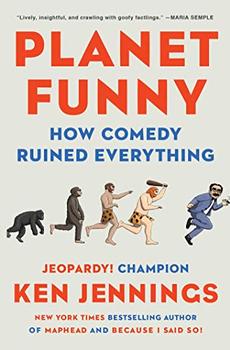Summary | Excerpt | Reviews | Beyond the Book | Readalikes | Genres & Themes | Author Bio

Critics' Opinion:
Readers' Opinion:
First Published:
May 2018, 320 pages
Paperback:
Jul 2019, 320 pages
 Book Reviewed by:
Book Reviewed by:
Norah Piehl
Buy This Book
Today, we're savvy enough about the influence of comedy that we take it very, very seriously. Just ask Seth Rogen and James Franco, who were issued hulking round-the-clock studio bodyguards in 2014. Just ask advertisers paying five million dollars to show a goofy, cameo-filled comedy sketch during a Super Bowl time-out. Just ask ordinary people who have lost their jobs when the wrong joke attempt went viral on Twitter. Just ask the staff of Charlie Hebdo.
Comedians: Is There Anything They Can't Do?
But in the main, it's a good time to be in the business of being funny. Comedians, accustomed to their longtime roles of put-upon underdogs and insecure sideline snarkers, are adjusting slowly to their growing prestige. They should look to the United Kingdom, which got here first. In Britain, comedians are certified public intellectuals. The British have a whole TV genre that we don't: erudite panel shows on which quick-witted punsters with posh Oxbridge educations try to dazzle Stephen Fry or a Stephen Fry equivalent with their knowledge of current events and general knowledge. In 2008, Lancashire stand-up Jim Bowen made headlines for going onstage at a London comedy club and doing a full act of fourth-century Roman jokes, not a gambit you're likely to see on Comedy Central Stand-Up Presents anytime soon. Or take the former members of Monty Python: Michael Palin is a past president of the Royal Geographical Society who has explored the poles and directed documentaries on World War I and Matisse. Terry Jones, an avid medievalist, tried to solve the death of Chaucer in a 2003 book. John Cleese has a species of lemur named after him, for his conservation work in Madagascar. In American post-comedy life, the closest thing we have to this is Steve Martin, who is now a passable banjo player.
But this is changing! Writing a book or two of funny essays is now a virtual requirement of comedy legitimacy and led to seven-figure publishing advances for hot commodities like Tina Fey, Aziz Ansari, and Lena Dunham. This isn't a venerable trend in American publishing; it really only goes back to Jerry Seinfeld's 1993 bestseller SeinLanguage. Around the same time, we started putting legendary comedians on postage stamps: Jack Benny, Laurel and Hardy, and Abbott and Costello in 1991, then Bob Hope, Groucho, and Burns and Allen in 2009. Gloria Steinem and Amy Schumer started hanging out together at comedy clubs—and why not? They're both feminist icons. The unlikeliest comedy hangers-on were the fabulously good-looking ones. Celebrities like Jon Hamm and Justin Timberlake were among the biggest sex symbols in the world, but they were tired of lounging on beaches with supermodels. What they really wanted to do, apparently, was hang out with comedians! Only a Funny or Die director telling them how great that improv was on the last take would fill the comedy-shaped hole inside of them. It was the exact reverse of generations past, when an alpha dog like Frank Sinatra might let one comedy goofball—a Joey Bishop, say—join his gang. In 2014, Esquire even began a monthly feature where a rotating series of comedians were pressed into service as advice columnists. After all, is there a demographic more stereotypically famed for having their lives together than stand-up comics? Ask a comedian; they always know what to do.
And once comedy is done fixing your love life and roommate troubles, why not put it to work on public policy? The rise in comedy prestige was most notable on late-night TV, where a stand-up veteran like Jon Stewart, someone you might have seen on cable in 1992 telling jokes about "Just Say No" ads in a black leather jacket, acquired the moral authority of an éminence grise during his sixteen-year tenure on Comedy Central's The Daily Show. He was the closest thing millennials had to a Walter Cronkite, and his mere proximity had the power to create similarly endowed acolytes, a Legion of Substitute Stewarts that grew to include Stephen Colbert, John Oliver, Larry Wilmore, and Samantha Bee. Stewart knew that hosting an MTV talk show in the early Clinton era wasn't exactly the same journalistic training as covering the London Blitz, like Edward R. Murrow had, and was always the first to remind commentators that he was a comedian, not a reporter. But this was mostly just a (pretty transparent) way to preempt criticism. Stewart's influence among young people was sometimes overstated in the press, but in 2014, 12 percent of the country told Pew Research that they got their news from The Daily Show, roughly the same reach as USA Today. When you're a news source for as many people as the country's top-circulation newspaper, you're effectively a journalist, whether that's how you imagine your résumé or not. "My Comedy Channel Is Fox News. My News Channel Is Comedy Central," read the popular bumper sticker.
Excerpted from Planet Funny by Ken Jennings. Copyright © 2018 by Ken Jennings. Excerpted by permission of Scribner. All rights reserved. No part of this excerpt may be reproduced or reprinted without permission in writing from the publisher.





The Funeral Cryer by Wenyan Lu
Debut novelist Wenyan Lu brings us this witty yet profound story about one woman's midlife reawakening in contemporary rural China.
Your guide toexceptional books
BookBrowse seeks out and recommends the best in contemporary fiction and nonfiction—books that not only engage and entertain but also deepen our understanding of ourselves and the world around us.